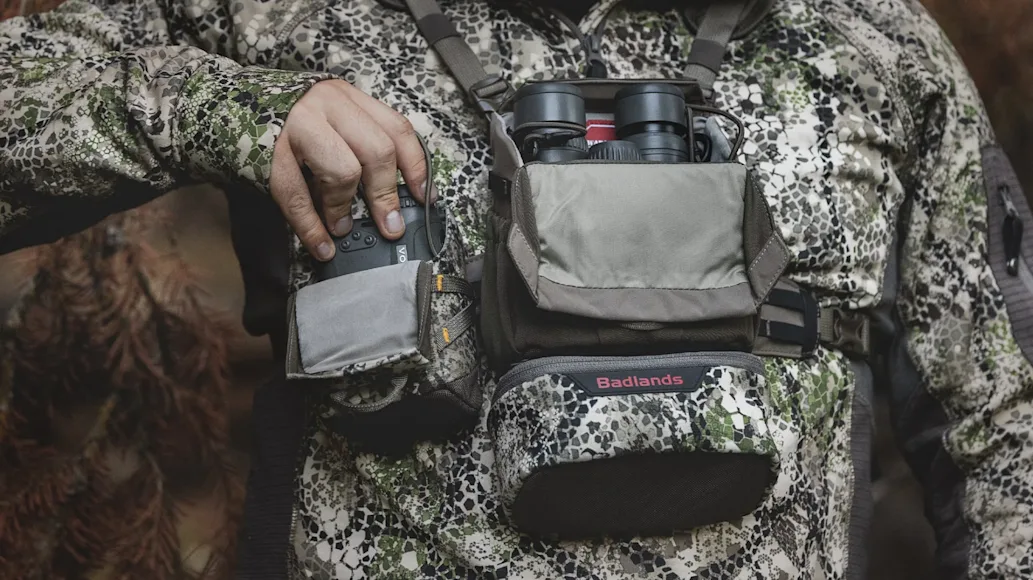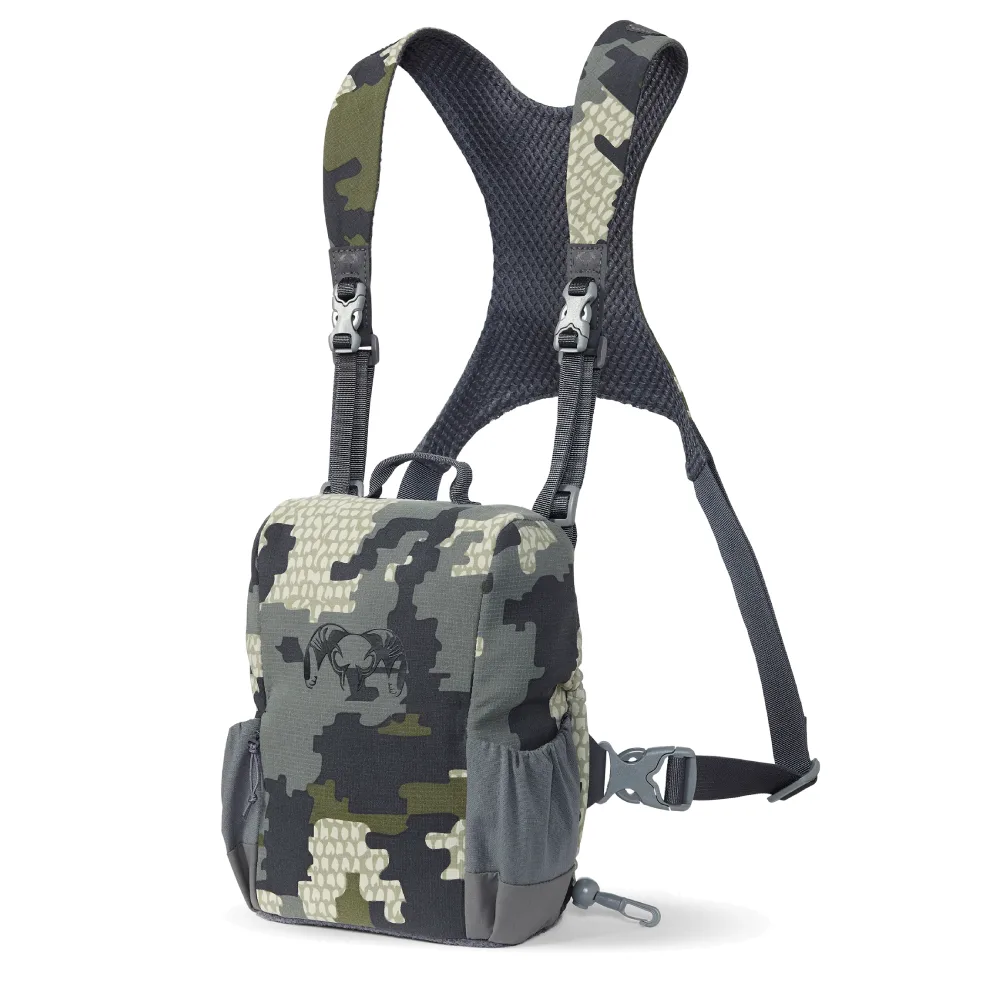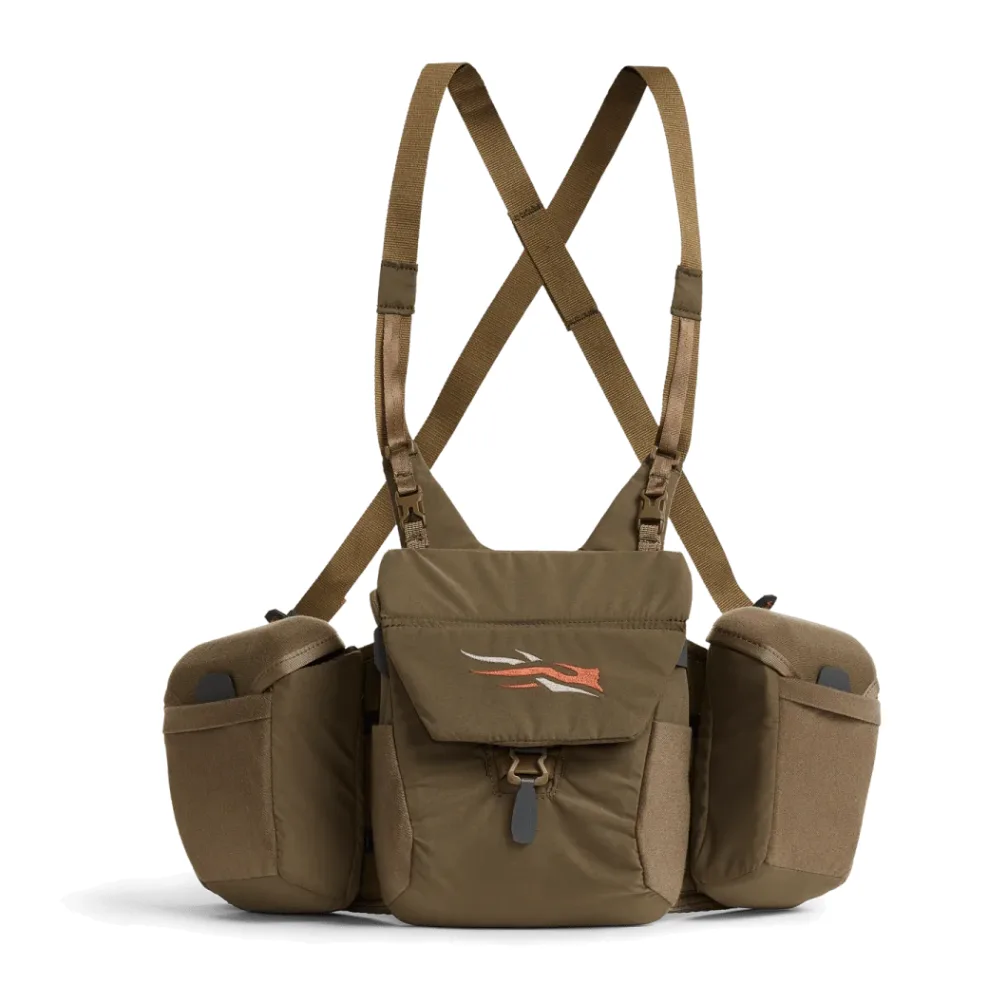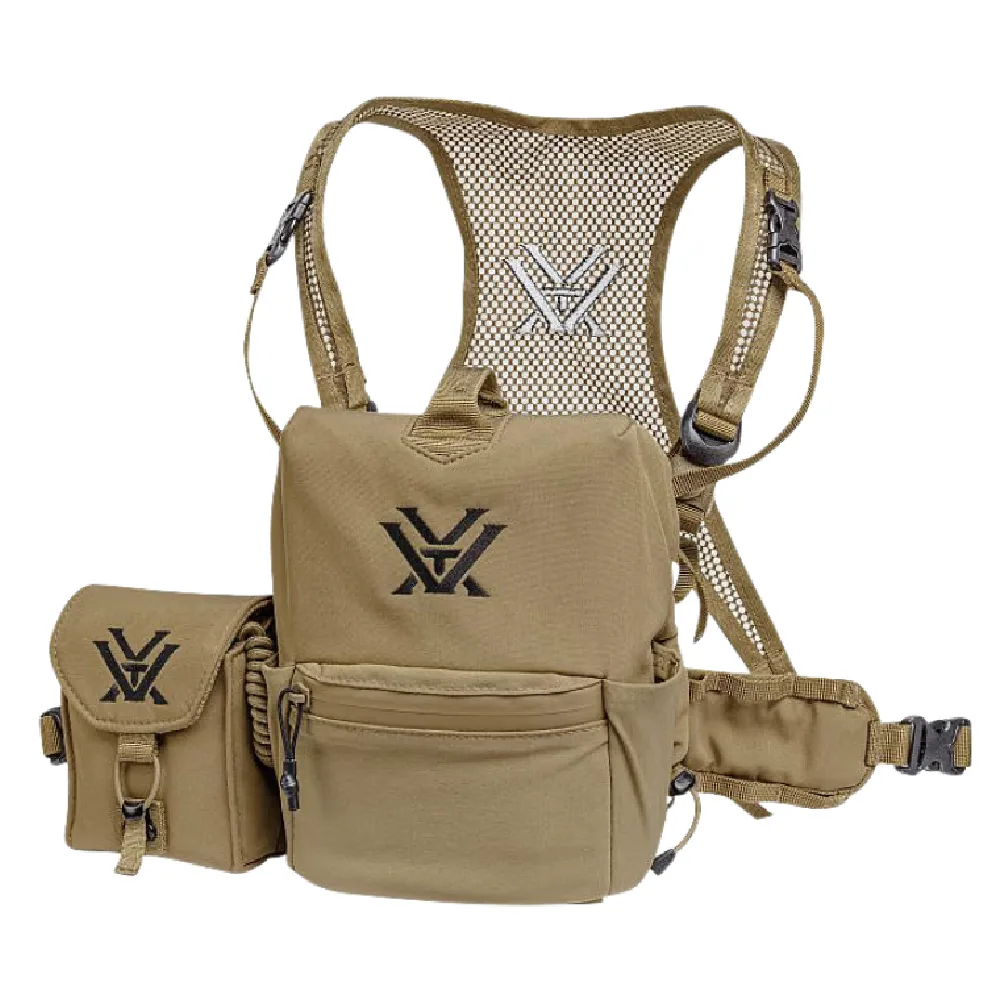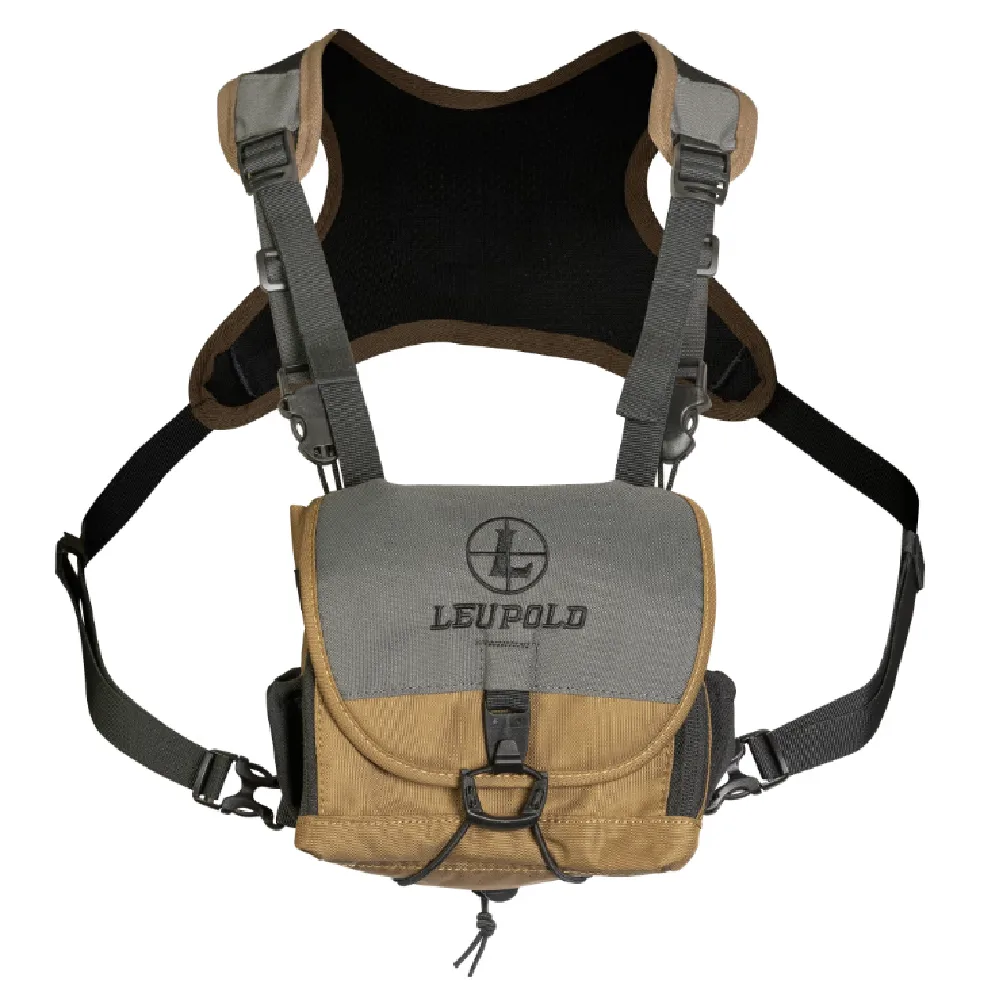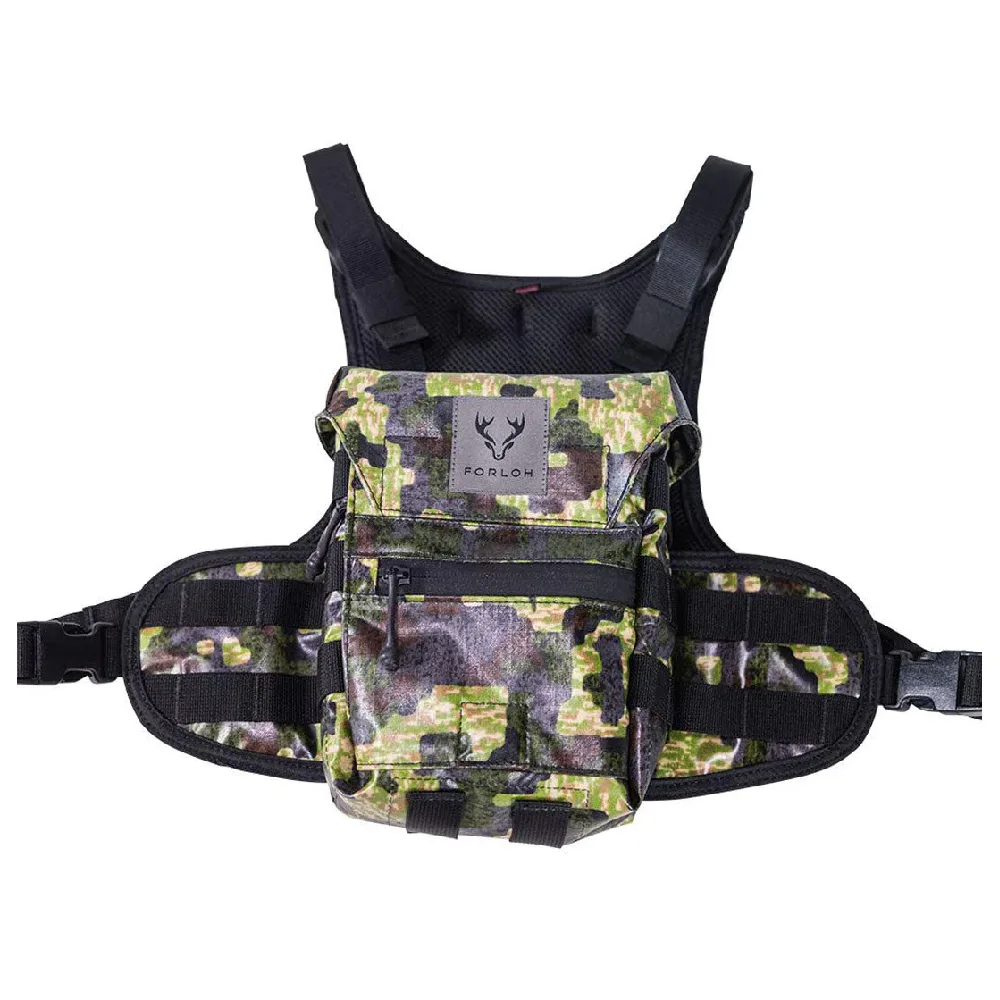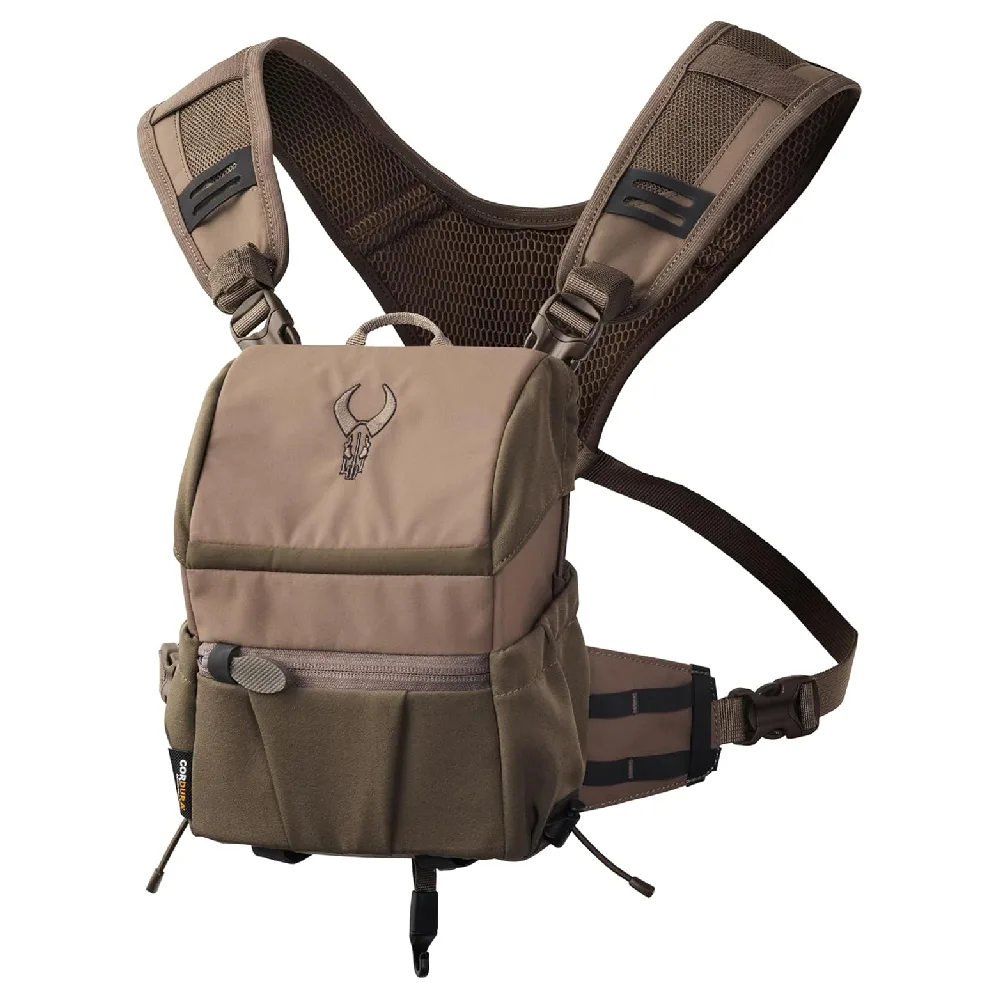We may earn revenue from the products available on this page and participate in affiliate programs. Learn more ›
A binocular harness is a useful piece of gear that most hunters overlook. And when you can’t find an accessible spot for your binos, rangefinder, or wind checker, you’ll be wishing you had a harness strapped around your chest. They also offer protection for expensive and cheap binoculars, especially when hunting in rugged terrain. But how do you find the right one for your hunting style? Things like location, species, hunting technique, fit, and design are all going to factor into your decision. I spent the summer testing bino harnesses to see what hunters should buy and what they should avoid.
By the end of my test, I found my favorite models for different hunting situations. I learned what useful features hunters need and what bells and whistles they don’t. But the best part is you don’t have to try on endless models to find out which ones are actually worth their salt because I already did it. Here are the best binocular harnesses being made today.
Best Overall: KUIU Pro
Quietest: Sitka Mountain Optics Harness
Best Value: Vortex GlassPak Pro
Best Budget: Leupold Go Afield
Best Made in the USA: Forloh Method
Best for Bowhunting: Badlands Bino EZ

Best Overall: KUIU Pro
Specs
Dimensions: 8” x 6.5” x 3.25” (large)
Weight: 11.8 oz
Material: Toray nylon and waterproof membrane
Accessories: Extra pocket, rangefinder holder, hydration rig
Pros
Extremely comfortable
Very quiet
Straps are very organized
Cons
Bonus pockets are a little small
No back pocket
The KUIU Pro bino harness stands out from the others in terms of comfort. Especially the back strap. It doesn’t have a ton of padding, but it hugged my back better than any other harness on this list. I was able to snug the straps a little tighter than the other models without losing comfort. This means a more secure main pouch when traversing tougher terrain. The Kuiu Pro was also better in the field—crawling and walking—than the other options. It has a low profile design that makes it easy to shoulder a rifle, and the main pouch has just the right amount of rigidity without becoming uncomfortable.
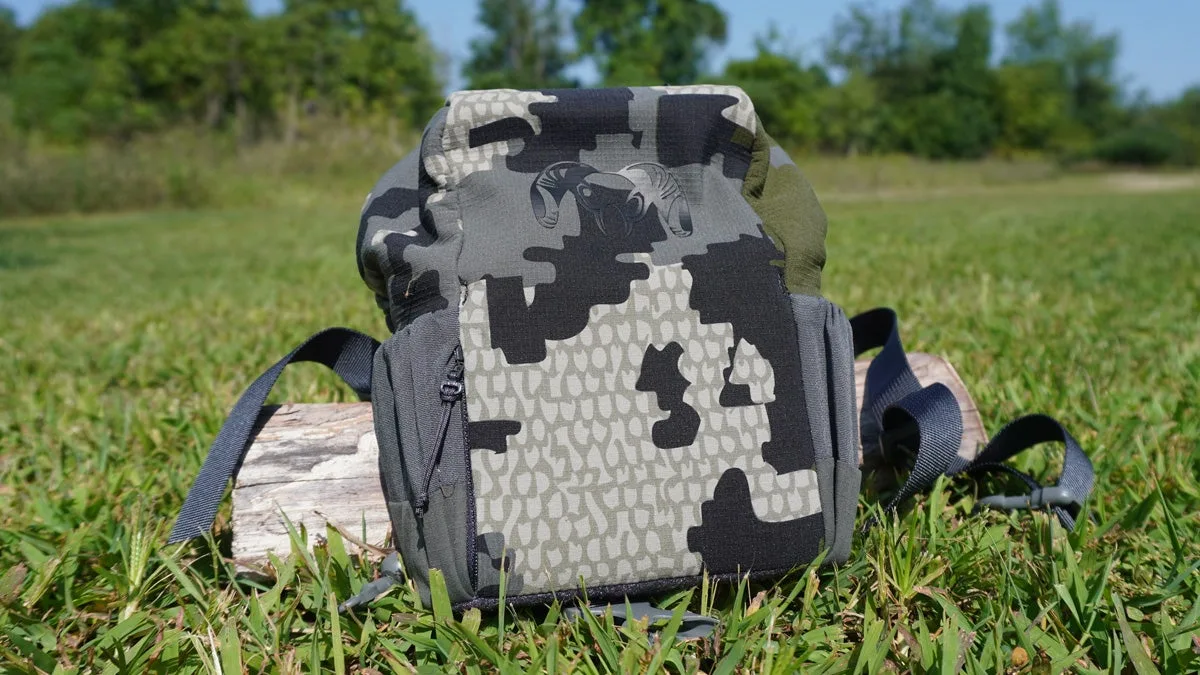
The only downside is the pockets, which are all extremely small. The front pocket won’t hold much more than a hunting license, and the side pockets cinch tightly, but I don’t think they will be able to fit much inside, either. This won’t be an issue for hunters looking to stay light and only carry a binocular—which the KUIU Pro does well. It held my 10X42 Nikon’s perfectly. The $119 price point is extremely competitive when compared with other high-end binocular harnesses available today.
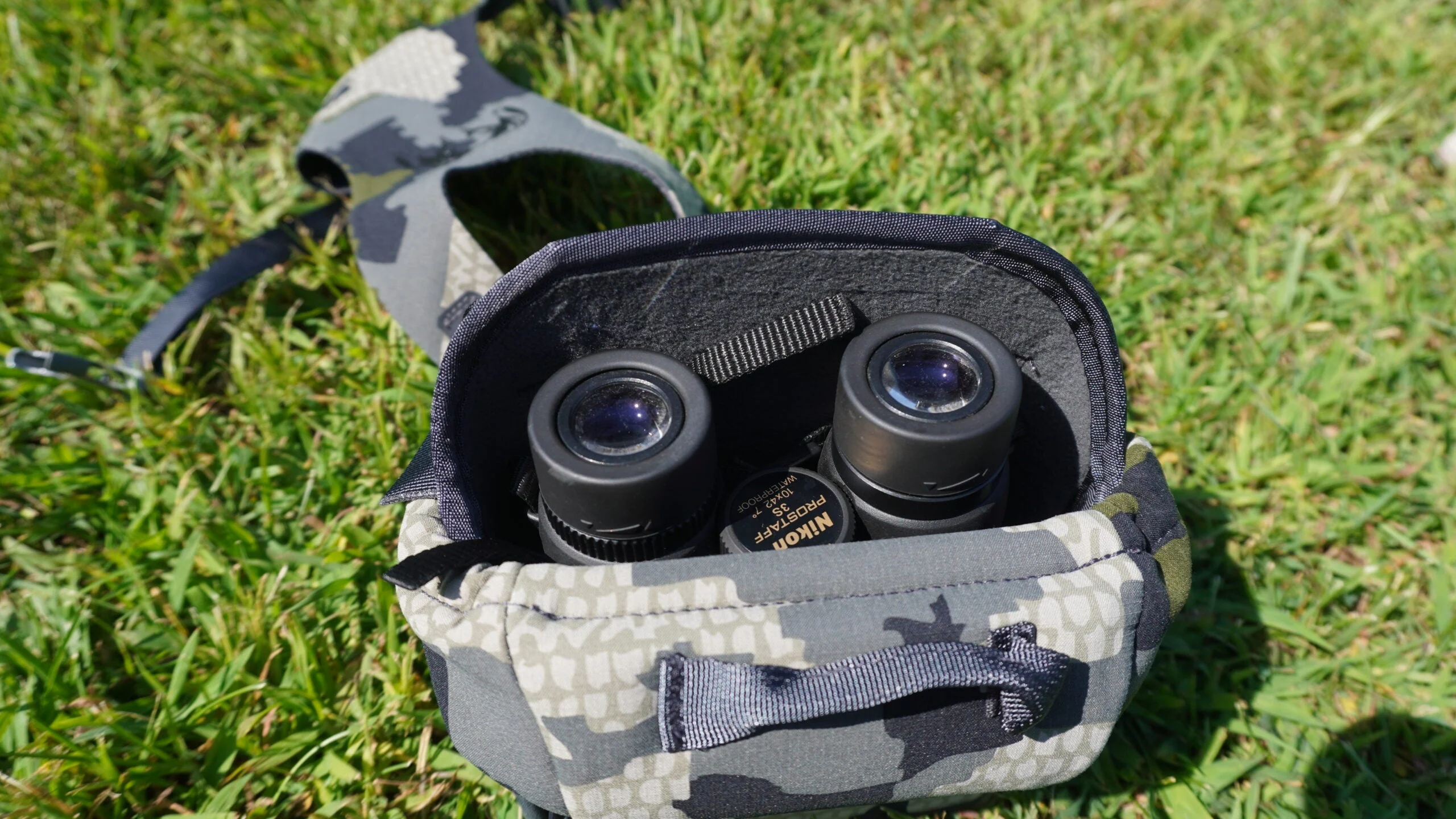
Quietest: Sitka Mountain Optics Harness
Specs
Dimensions: 14” x 10” x 2.5”
Weight: 1 lb 2 oz
Material: Brushed polyester
Accessories: Modular side pockets
Pros
Great storage capacity
Extremely quiet
Excellent weather protection
Cons
No padding on straps
Storage can’t be expanded
Sitka’s harness was an immediate standout in terms of storage capacity. It features two small modular side pockets that are perfectly sized for a rangefinder and wind direction indicator. But I was most impressed with how silent it is. Simply pull down and then up on the main pouch to undo the latch, and the protective hood flips up quite easily. The harness is simple, straightforward, and comfortable to wear.
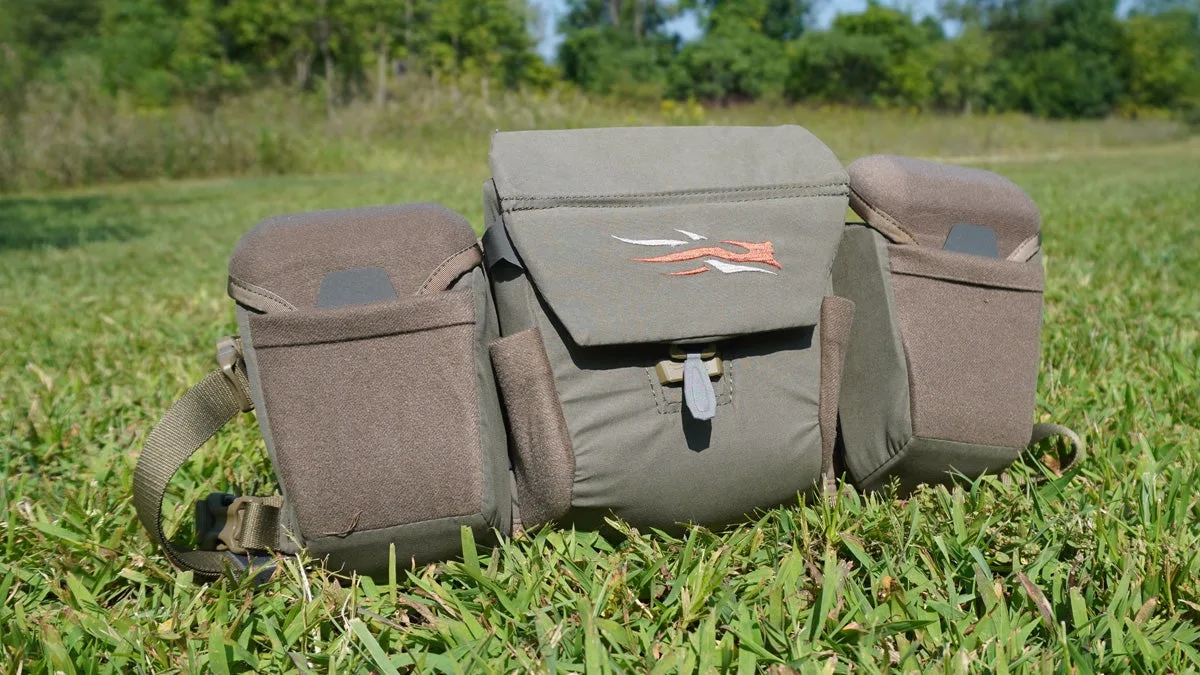
The straps are hit or miss, depending on the person. Sitka chose to go with simple straps and no padding. This makes the harness incredibly light and easy to adjust. But I found they also cut into the body a bit when wearing light layers. However, another editor on staff swears by this harness, and he wears it from early season archery elk into late season rifle mule deer.
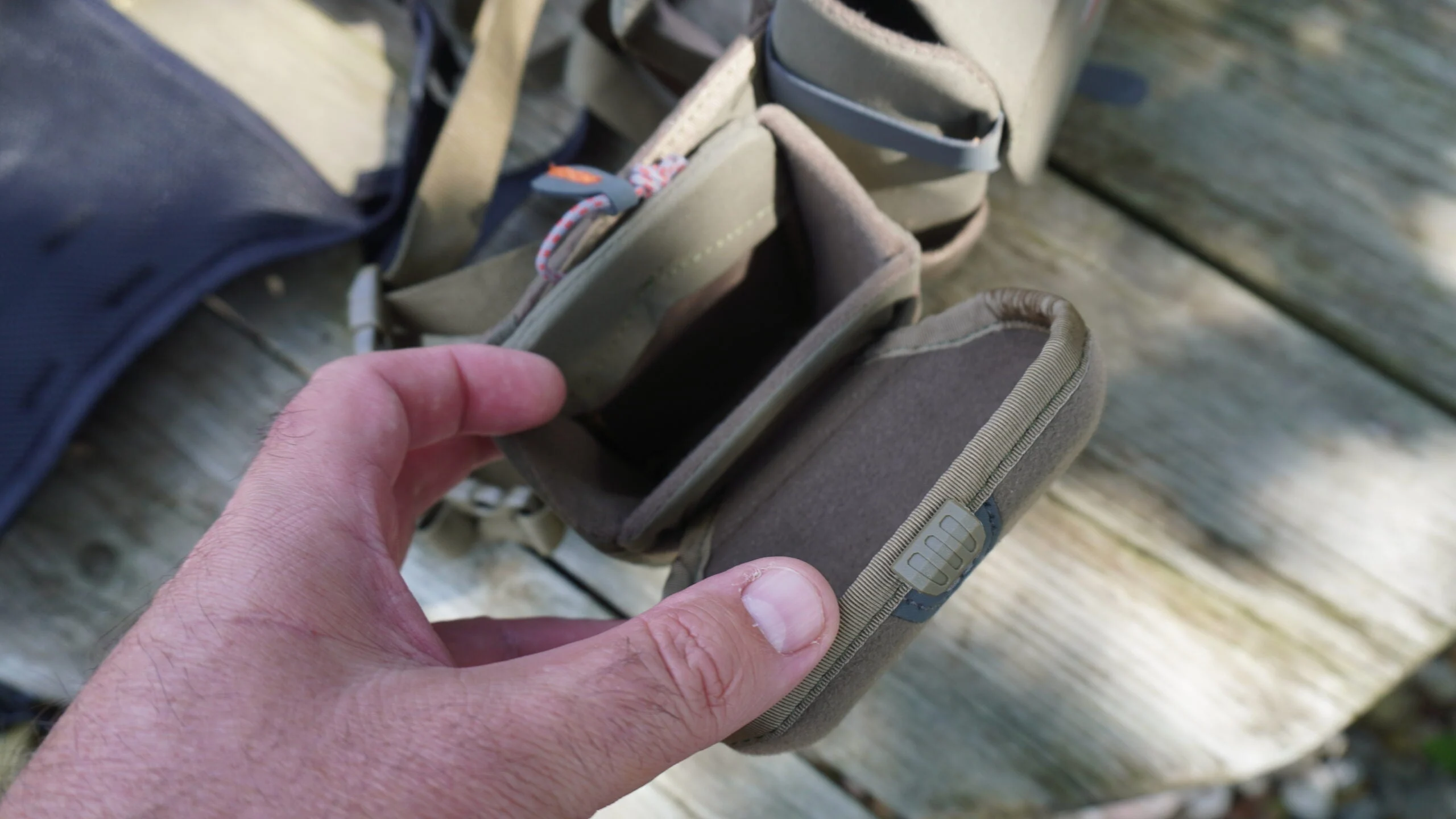
Best Value: Vortex GlassPak Pro
Specs
Dimensions: 7.3” x 6.5” x 3.5” (small); 9” x 7.3” x 4.3” (large)
Weight: 14.2 oz (small); 17 oz (large)
Material: Microfiber
Accessories: Rangefinder pouch (included) sidearm holster
Pros
Very quiet
Comfortable
Rangefinder pouch included
Cons
Lack of excessive strap management
The GlassPak is a brand-new offering from Vortex, and it was my second favorite harness that I tested. Vortex packs a tremendous amount of value into this harness by including a rangefinder case and a comfortable neck strap. The main case is extremely rugged and provided excellent protection during my durability tests. The top of the main pouch and the rangefinder pouch both feature an extremely soft cloth that helps cushion against shock. But the back of the pouch has good rigidity that helps keep the shape.
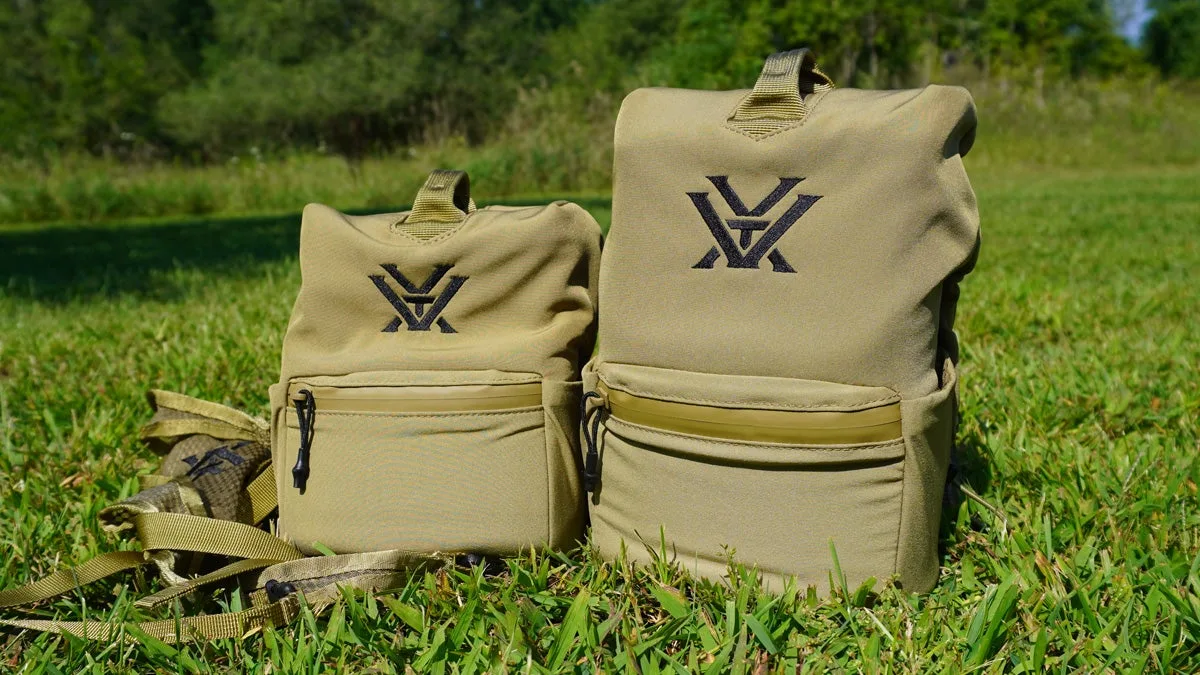
This harness is very comfortable, but I wish there was a better way to manage the tag ends of the adjustable straps. There are a lot of loose ends and snag points that can be problematic in thicker brush. But this can solved with a light modification. The GlassPak is the closest to a one-stop shop thanks to the included accessories and makes me wonder why other manufacturers don’t do the same.
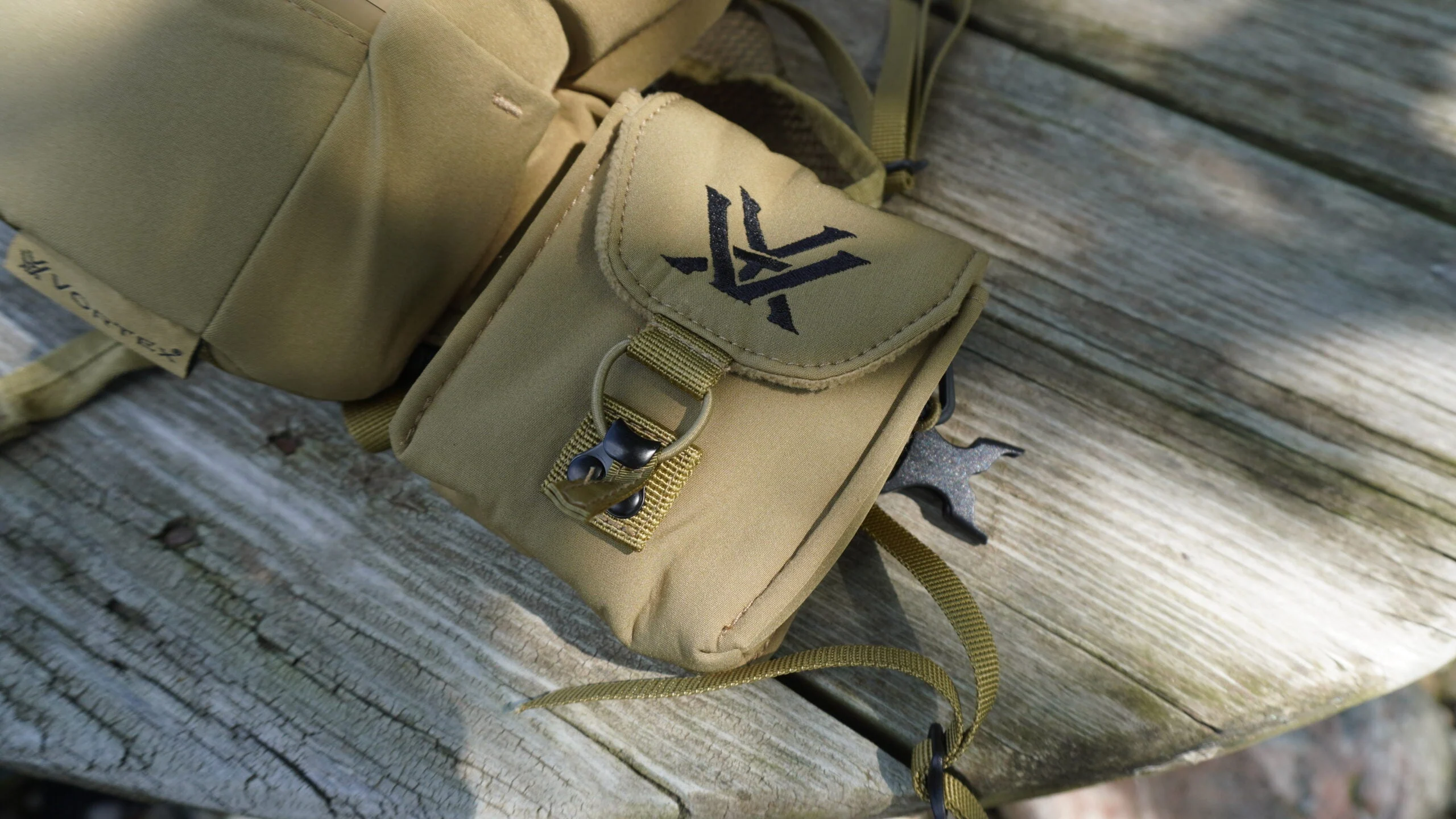
Best Budget: Leupold Go Afield
Specs
Dimensions: 6.25” x 6.25” x 2.5”
Weight: 6.72 oz
Material: Nylon
Accessories: None
Pros
Great price point
Simple operation
Quiet
Cons
Lack of accessories
Leupold has been one of my favorite optics manufacturers for a while now, and they sell this solid harness that won’t break the bank. It normally costs $50, but it’s often on sale for as low as $40. It is perfect for hunters on a budget or those who don’t need to take a harness with them on every single trip to the woods. The Go Afield is simple and quiet. It also features an extremely nice, padded back that adds extra comfort not normally found at this price point. While Leupold makes some fine bino harness accessories, including a semi-auto pistol holster, these accessories are not designed for the Go Afield. But for $50, that is expected.
Best Made in the USA: Forloh Method
Specs
Dimensions: 8” x 6” x 2.5”
Weight: 18.4 oz
Material: 210-denier diamond ripstop nylon
Accessories: Rangefinder and accessory pouch, bullet pouch
Pros
Comfortable
Sheds water nicely
Quality zippers
Cons
Material shines and reflects light
Does make some noise
The Forloh has more of a high chest position. The padded straps are easy to adjust and keep it centered even while crawling. This harness would be my top choice for rainy or wet conditions due to the 210-denier ripstop nylon. I soaked it because Forloh touts it as being waterproof—and it was. I found water wipes away from the material rather easily with no drying required. But this does make the material a little shinier and louder than I’d like. It has a slight “crinkle” sound to it. But if you’re hunting in extremely hard rain, it’s not likely game will hear it.
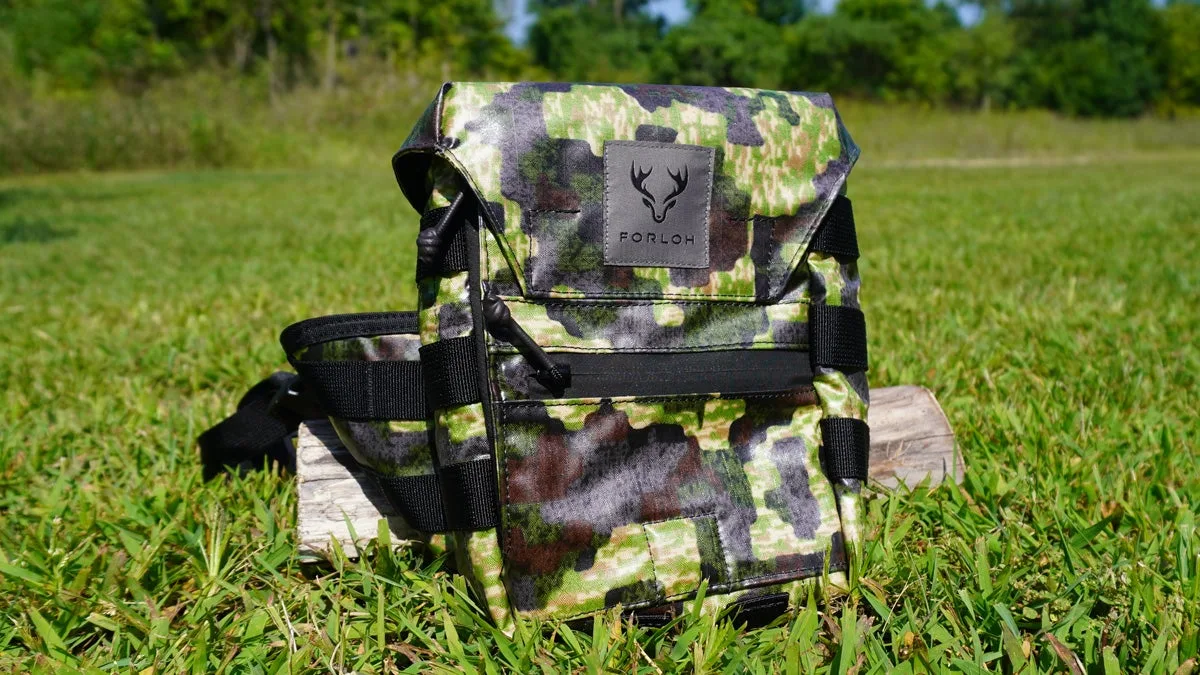
The magnetic closure on this harness makes the main compartment feel more secure than any of the other harnesses on this list. The bino leash is also well designed because it attaches to the interior main compartment, and lessens the number of dangling straps. Even better, it doesn’t hang up as often when busting through thick brush. Forloh also put Molle loop attachment points everywhere on this thing, making it customizable to your heart’s content.
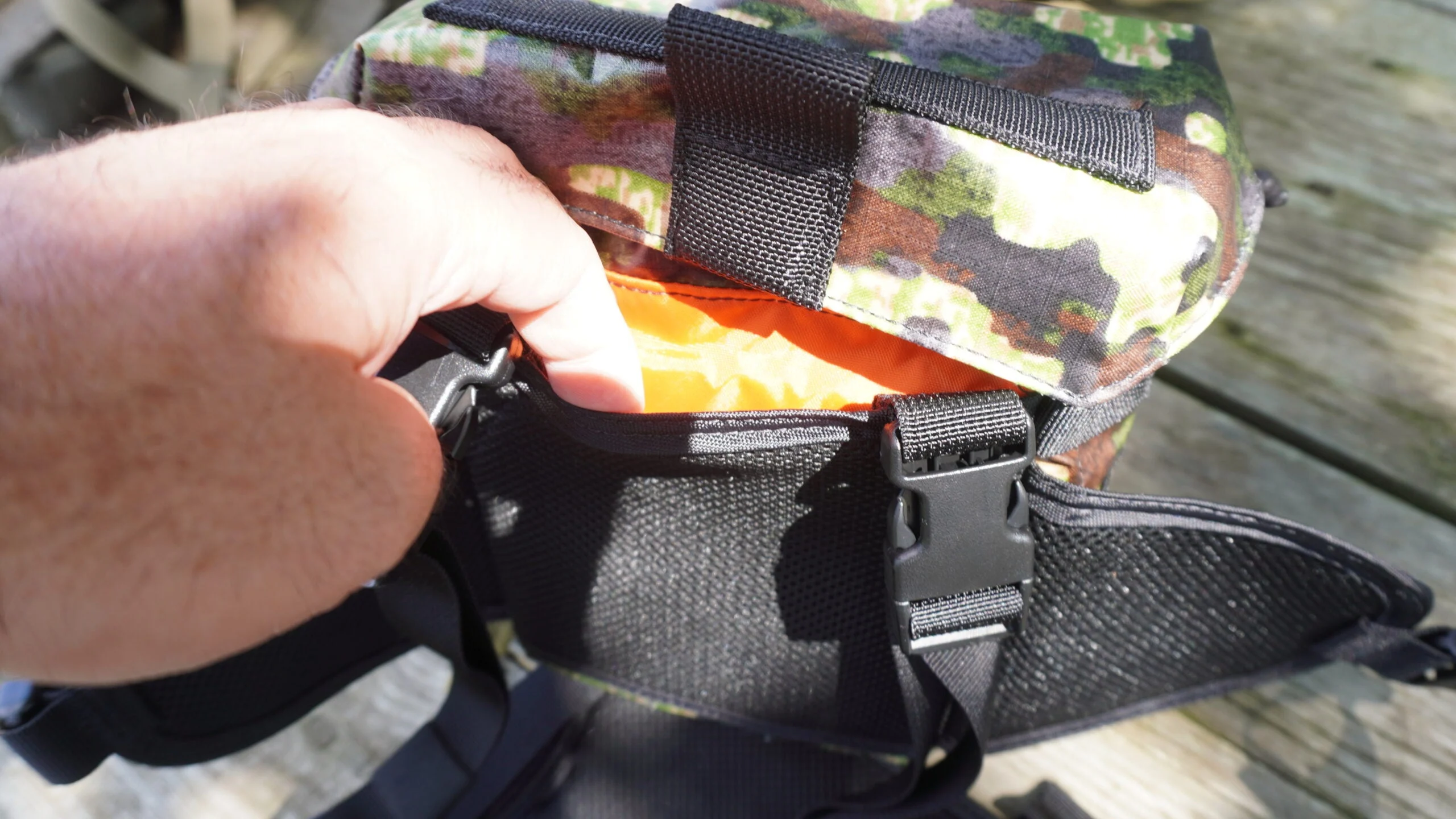
Best for Bowhunting: Badlands Bino EZ
Specs
Dimensions: 6.125” x 5” x 2.5” (small); 7.25” x 5.5” x 3” (medium)
Weight: 1.32 lbs
Accessories: Rangefinder cases, bear spray holster, MOLLE attachment points, extra pouches, ammo sleeve
Pros
Versatile modular design
Low profile
Handy bow loop
Cons
Quick attach rings are too noisy for bowhunting
Tends to be small for optics
We like the Badlands harness due to the low profile design that makes it easy to draw or mount a gun without the harness interfering. It also has a bow hook on the bottom where you can hang your rig while glassing. It’s a small feature, but a useful one. Hunters can buy accessory pockets and ammo sleeves to add to the harness. But it comes with a modular accessory system that includes Molle attachments for specific customization.
The interior pouch is a bit small—my 10X42 binos were a tight fit—and I don’t like the quick-release carabineer rings. They’re large, plastic, and rattle way too much for bow range. The good news is that it’s easy to rig up something quieter. Badlands also has a good warranty program should something fail.
How We Tested Binocular Harnesses
To test the harnesses on this list, I walked at least two miles with each one fully loaded. To evaluate fit and comfort, I simulated different hunting scenarios, from crawling across the ground to hiking over two miles in different terrain types. I also shouldered a rifle with each to see if the harness would interfere with mounting a gun.
I did all my testing in warm weather with light layers so I could see how comfortable the harnesses were close to the skin. If they are comfortable with a T-shirt, they’ll usually be comfortable with a jacket, too. They just need to be adjustable. I also noted how securely each harness held the optics inside. I specifically looked for any movement or shifting while traversing difficult terrain.
I carefully inspected all the fasteners and latches on each harness and noted any noise they made, no matter how slight they were. Finally, I tested the durability and protective power of each harness by dropping them from height to see how each fared with a binocular inside. I also dragged them across the ground to test abrasion while crawling over rough terrain on a stalk.
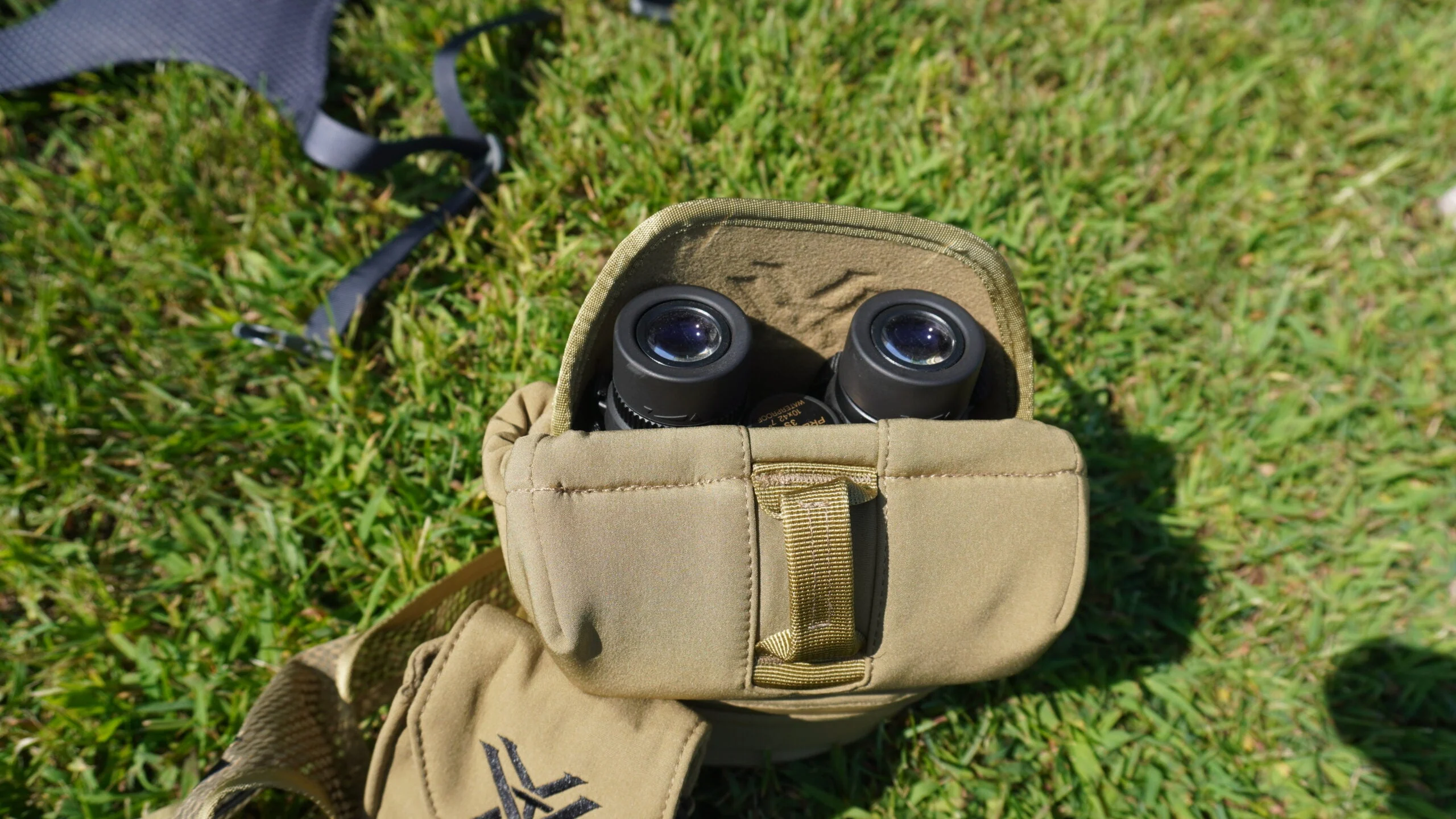
What to Consider When Choosing a Binocular Harness
There is no “one-size-fits-all” approach to binocular harnesses, which is why we reviewed a variety of models. If you’re going bowhunting, you’ll want to consider something low profile that offers maximum string clearance. We also recommend you practice shooting with the harness on before heading into the field. This will help identify any problems with the harness you’ve chosen and your archery setup.
You should do the same if you plan to hunt with a rifle. Although a harness often isn’t as big of an issue with a firearm, it pays to find out any potential problems on the gun range and not when staring down a trophy buck. Testing how the harness works with your equipment will also help determine if the setup is going to be comfortable with your body for long periods of hiking and sitting.
Glass Protection
While more evenly distributing the weight of your binoculars is a great bonus, the whole reason harnesses were designed in the first place was to offer a level of protection and easy access to optics. And let’s face it, the price of a quality pair of binoculars keeps going up, meaning protection in the field is more crucial than ever. The last thing you want to do is shatter a lens while trying to belly crawl your way into bow range of a big buck.
Expensive harnesses are well over $100, but they are also made of better materials that offer more padding. The exteriors are also tougher, and able to withstand abrasion on rocks, sagebrush, or tree bark. If you plan to do most of your hunting while sitting in a mild environment, you probably do not need a harness that is super rugged. Covered harnesses become most important in harsh weather, especially cold precipitation that could potentially damage an optic if it gets inside.
Comfort
Most harnesses are quite comfortable and fully adjustable. But you’re going to want to try them on over your hunting clothing before you head into the field. Opening morning is not the time to find out the straps dig into your shoulders, or the extra storage pockets don’t stay secure while walking. Take the time to hike around with the harness on a variety of terrain before the season starts. Pre-season scouting is perfect.
If you plan to wear a harness in a tree stand, or saddle, there’s another layer of pre-season testing. First, make sure the binocular harness doesn’t interfere with the safe operation of the treestand harness. On the flip side, ensure your safety equipment isn’t interfering with the ability to take your binoculars out of the harness pouch. Those who plan to use binoculars for birding can often get away with more of a bare-bones setup that simply keeps your optic within easy reach.
FAQs
Q: Are binocular harnesses any good?
A quality pair of binoculars can get quite heavy, which is why a harness is so handy. They help to distribute the weight of a heavy optic much better than a simple strap around your neck. You’ll have considerably less strain, allowing you to stay in the field longer. A good hunting harness will also keep binoculars from interfering with your draw while bowhunting or the shouldering of your rifle.
Q: What are ergonomic straps?
Ergonomic straps are adjustable and comfortable. The best straps on a binocular harness will allow the user to ensure a snug fit. They may also have straps that are more padded. I personally prefer straps that are padded over the shoulder blades for optimal comfort.
Q: How do I attach my binoculars to my harness?
Each harness has a different type of attachment system. As we noted with the Badlands harness, it has a series of quick-release rings that make it incredibly simple to clip the optics to the harness. However, most harnesses have a series of tension straps. It’s usually a simple manner of running the straps through the loops on the binoculars and tightening them down.
Final Thoughts
The KUIU Pro harness was my favorite due to the comfort and versatile camo patterns. They have proven quite effective for me on Michigan whitetails, and I am confident they will do just as well for Western big game hunting. But all of the harnesses excelled in evenly distributing the weight of a heavy binocular and offering quick, easy access. Give one a try this season, and you’ll see why they’re so popular for relieving neck strain during long days in the field.
Why Trust Us
For more than 125 years, Field & Stream has been providing readers with honest and authentic coverage of outdoor gear. Our writers and editors eat, sleep, and breathe the outdoors, and that passion comes through in our product reviews. You can count on F&S to keep you up to date on the best new gear. And when we write about a product—whether it’s a bass lure or a backpack—we cover the good and the bad, so you know exactly what to expect before you decide to make a purchase.

